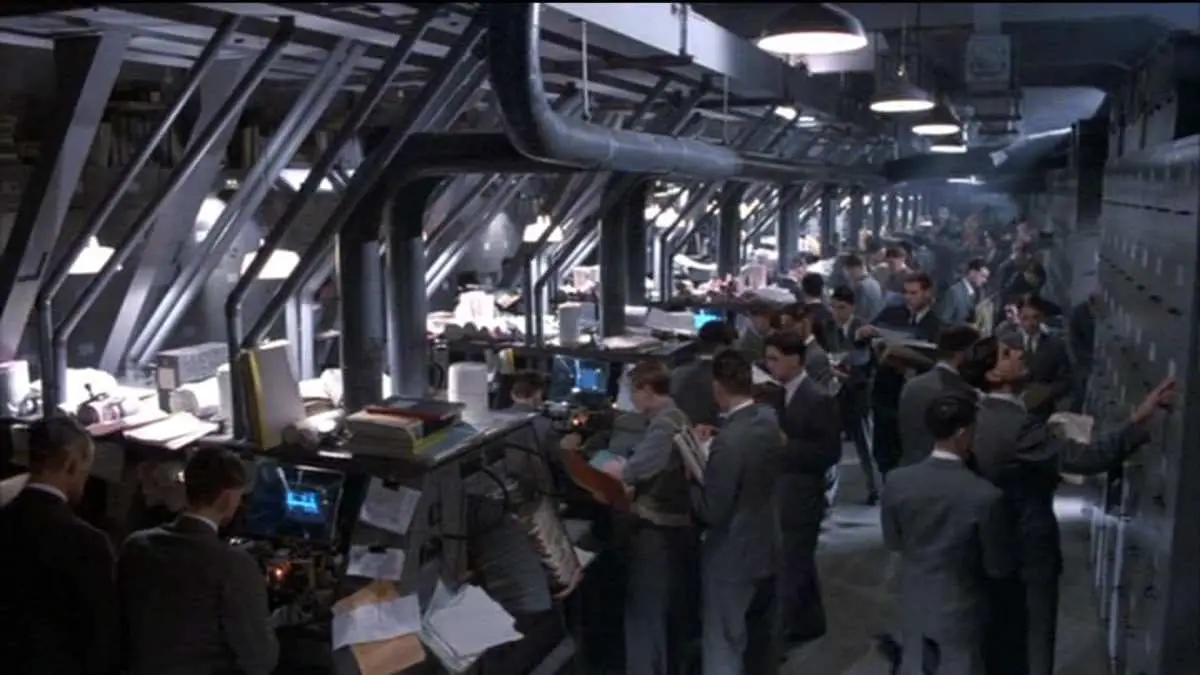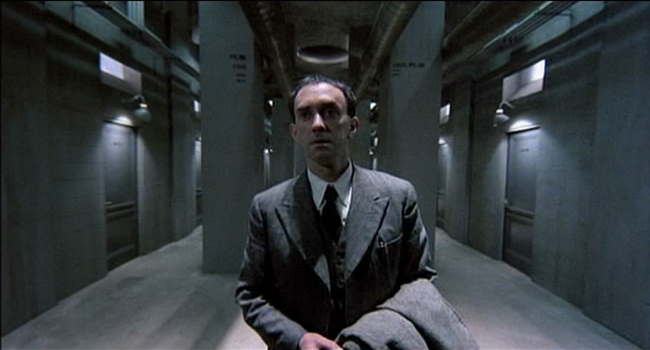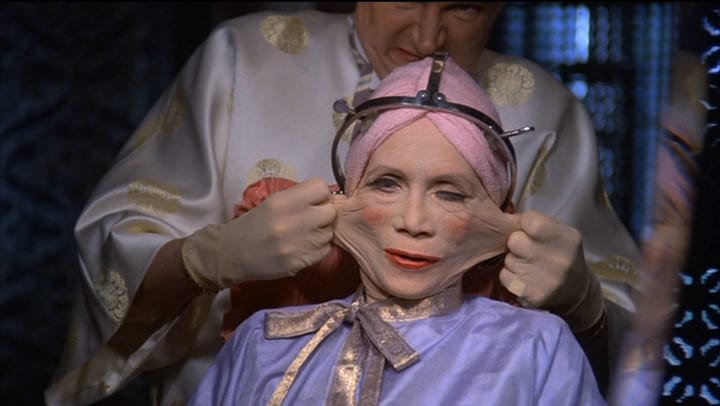Terry Gilliam’s 1985 film Brazil is a lot of things. It can fit in with at least three genres: it’s biting satire, whimsical fantasy, and seething drama with, maybe, a dash of horror. It’s a heavy film that for many invokes comparisons to George Orwell’s 1984 (though Gilliam claims to have never even read the book), and deals with themes and subject matter that makes it no less prescient today than when it was first released. For all the reasons one should watch what in my estimation is Gilliam’s best work, perhaps what Brazil can best offer a 2020 audience is a reflection on norms and precedents and a cautionary tale of the return to normality.
2020 entered the scene like a fireball flung from space that set fire to every third person to encounter it. January saw the first publicized cases of COVID-19, which would send the world into crisis, becoming a global pandemic in just the third month of the year. What the virus revealed to the entire U.S. (as well as the rest of the world) was that decades of inadequate healthcare oversight, racially disproportionate allocation of resources and funds, and federal government mismanagement of supplies and tests meant an overwhelming human loss and complete disruption of our day-to-day lives. Stores were closed, businesses were shut down, and those privileged enough were told to work from home as the problem of deficient personal protective equipment and testing kits proved overwhelming. Nationwide, states were shut down, stay-at-home orders put in place, and schools and churches were closed. Professional sports seasons were canceled or postponed, concerts called off, and the one that hits closest to the (well, my) heart, the Cannes film festival was effectively lost, with organizers hoping to put something together later in the year. Quite a blow considering Spike Lee has been selected Jury President—the first Black president in the festival’s history—and last year’s event awarded the top prize Palme d’Or to Bong Joon-ho, paving the way for his film Parasite to eventually be crowned the first non-English-language film to win Best Picture at the Academy Awards.
Amid the chaos, anxiety, job loss, uncertainty, and overall exhaustion of just trying to get through each day’s new hellscape, many turned to art with their now abundant free time. It was a cinephile’s time to shine, as people everywhere were stuck in their homes and finally willing to take up the suggestions of those who put far too much time into deciding which director had the best debut feature (it’s David Lynch, by the way) or how to best organize their vast collections of physical media. In an effort to lighten the burden of living through a pandemic (and, let’s be honest, to alleviate the hit from millions of out-of-work people with less disposable income) streaming platforms offered free one-month trials, physical media labels offered standing discounts, and many movies that had before been unavailable saw the light of day for the first time.

Enter: Brazil. I had seen it a fair number of times and thought it was such a creatively mammoth work of art that I had so far been too intimidated to write anything about it. But it is like Stanley Kubrick said (paraphrased): sometimes you see a movie at a certain time that allows you to think of it in a way that you were not able to before. Watching Brazil during a stay-at-home order in the midst of a pandemic enabled me to understand the world Terry Gilliam built as one that, in many ways, looked like the one I had heard many profess to be eager to return to “once this is all over.” Not only that, but the new language created at an alarming rate and mobilized just as swiftly during the pandemic allows one to see how, left unchecked, Gilliam’s dystopian world of Brazil is one that could be rapidly adopted as long as it promised the “return to normal” we so crave.
Gilliam introduces the audience to Sam Lowry (Jonathan Pryce), who can only dream of a life where he can escape from the needless bureaucracy, overbearing mother, government surveillance, and insurrectionist bombings that fill his days. Sam lives in a world in which the government-controlled duct system runs through every home and office building in every part of the city as an insightful analogy to the almost tentacle-like structure governing bodies figuratively are.
Surveillance and bureaucracy are so extreme here that a series of forms must be completed and submitted for someone to have work done on one of these ducts, which also provides heat/air to the buildings they are within. In the event that one is unable to wait for such a process to go through the proper channels, there exists an underground (innertubed?) duct worker, somewhat of a legend, named Archibald “Harry” Tuttle (Robert De Niro.) It was this non-government-regulated ductwork that led to government agents attempting to arrest Tuttle, only to arrest Harry Buttle (Brian Miller) by mistake. While trying to rectify this mistake and ensure that his boss is not blamed for the error, Sam leaves the office and encounters the human beings that have been previously only been reduced to files that clutter his desk. While working on this assignment, Sam meets the woman with whom he has been dreaming about flying away and living a different life. It’s not lost on Sam he needs to escape from the life he currently leads, no matter how insulated and protected he may feel; he knows that all it takes is a typo before the government will drill a hole through his ceiling and forcefully take him out of his home.

Force people to stay at their homes, which should be a sanctuary, with the people they love, which should be a blessing—and just wait for people to take to the streets demanding their barbershop to be open. The capitalist economic structure that demands a high output of production in the shortest amount of time is so deeply ingrained within us that we fight for the opportunity to be labeled an “essential worker” and expose ourselves to a potentially deadly virus for which a vaccine does not yet exist. What a brilliant ploy by such an edifice to compose itself in such a way that a person’s worth is determined so much by how much they make and what they contribute to a society that they will not only willingly risk such exposure but also “hope” that they are awarded this coveted new use of the word “essential.”
This reality compels one to think about what that word means pre- and post-coronavirus. It looks a lot like the world Gilliam creates in Brazil, the one in which Sam feels like he is only as meaningful as his next promotion. His mother clearly feels this way too, as she deploys all of her resources to get him a higher-ranking job in a better department than the one he is in now.
It is not as bad for Sam, though, as it is for Archibald Buttle. He is the ultimate victim of the system: the one who is deemed unessential and more profitable to kill than to support. For Archibald, his trouble starts after a case of mistaken identity. But once the mistake is uncovered, it becomes a race to nowhere for each person involved to escape responsibility. When it is finally decided that the man be paid off for the woes brought about by the government’s mistake, it’s discovered that he has died due to some underlying health conditions exacerbated by the forceful removal from his home at the hands of the state. Rather than the blood being on everyone’s hands at this point, each department is pleased that the problem has disappeared.
One perhaps cannot help but make the connection between Archibald’s saga and the one surrounding enhanced unemployment assistance and stimulus aid debated during the pandemic. When one hears a comment from a sitting president that seems to accept the idea that people will die to save the stock market, it’s not difficult to assume that we’re all Buttles to this government—essential until we’re not, and better off dead than needing to be financially supported.
Additionally, Brazil also delves into the various ways in which the bodies of power are marked as successful on the back of the worker. Sam, his friend Jack (Michael Palin), and his boss Mr. Kurtzmann (Ian Holm) are all eager to fill their days at work and their nights with thoughts on how to get ahead at work the next day. Their souls are always at work, and if they are not attending a party hosted by someone who can aid in upward mobility in their work, then they are wasting their time (I wonder if Franco Berardi has ever seen Brazil). Sam utters the line, “I don’t want anything, not even to dream.” Work and the drive toward success is so embedded, not just in the characters in Brazil but in us as well, that even when given the opportunity to work within the home what actually happens is a subversion of space by the economic system sabotaging our home life and encouraging us to work longer hours, since our offices and homes are now one and the same.
It’s too early to say if this virus byproduct will dissipate as workers return to their physical offices, but it has already been floated that many of the jobs that easily moved into the home will remain in the home, meaning that we are only seeing the beginning of such a trend. What has also not yet been determined is how the states will reopen and whether public safety will be viewed with the same attention as the bottom line. Lives may be put further at risk in an effort to “return to normal” and get money flowing through the state again because, after all, the state is only as successful as its unemployment rate is low.
Also offered throughout the film is a critique of capitalist liberal democracy. It is viewed by most as the best, most virtuous form of government, though we can see in Brazil this form still leaves much to be desired. Gilliam presents a way to critically think about all that is inherent in the capitalist liberal democracy that taints the accepted notion of righteousness. He presents the uniformity in celebrations that serve to benefit capital. Gilliam shows the almost robotic way people in his film prepare to celebrate Christmas, which stands to reason because we all know that the holiday has little left to do with the birth of Jesus of Nazareth and everything to do with the dollar. After all, even the staunchest of atheists will be wrapping gifts for their friends and family on December 24.
By the same rationale, the disruption of the terror attacks that take place throughout the film is quickly hidden from view so as to not disturb the spending of the masses. But what is the government left to do when something as hard to escape as a global pandemic threatens the bottom line of businesses around the world? Fear not, for online shopping is a modern reality.

I can’t have been the only person whose inbox has been flooded with discount offers to stores that are currently closed. First came the emails telling me how each store I’ve ever stepped foot in was handling their sanitation practices in response to the pandemic, but once it was taken out of their hands and states were shut down, then came the emails with the sales and offers with “too good to be true” prices.
In an effort to both offset the lost revenue of store closures as well as address the new market of people stuck in their homes with nothing to do besides go on the internet, the individual was once again seized upon and reduced to simply a consumer in an effort to maintain the stronghold of the economic system over our everyday lives. Not only did companies take advantage of this opportunity, but yet again, the rhetoric from the government bodies praised those who were able to spend for keeping the national economy afloat. It turns out that not even a pandemic can be a disruption enough to ease the connection between economic structure and politics.
The conformity-through-sameness trope offered by a capitalist liberal democracy is studied throughout Brazil. Once Sam finally secures his promotion, he is told on his first day that he “won’t get anywhere in that suit” and reminded several other times that he must look like everyone else in order to both succeed and to not stand out. In a bureaucratic arrangement like the one we see in Brazil, like the ones we see and live through in our everyday lives, anyone standing out represents a threat to the order of things. One cannot reveal too much of a soul because economic and political structures thrive on isolating individuals to quell any threats to their order and power. When Sam suggests that they do something more for the Buttles after killing the family’s patriarch, he is immediately perceived as a threat, and a log is started to keep track of his various humanistic misdeeds to use against him if he gets too far down the path of guardianship that the government simply cannot bother upholding.
It is also a capitalist liberal democracy that prides itself on being above expecting citizens to make the choice between civil liberties or surveillance, without actually following through on that debate. Under “normal” circumstances, we have seen the descent into the surveillance state that we now live in, all in the promise of increased security. At the mall, you can rest assured that the store is protecting you (and themselves, of course) from shoplifters by monitoring your every move through the store. And when you leave the mall, the police can catch a break by not having to actually catch you speeding to send you a ticket from one of the red-light cameras.
With the addition of a security risk or a pandemic, an increased security state is an expected part of enhanced protection. The September 11 attacks brought about unconstitutionally “randomized” selection-enhanced security checks that even the staunchest of liberals praised as a way to prevent further terrorism. Similarly, fever-detection cameras at businesses and airports as well as the seizure of mobile phone data as a way to track the paths of infected persons were hailed as an ingenious way to mobilize technology to collectively fight against the virus. This immediate trade of civil liberties for increased security allows government authorities to access those files at will if the individual is thought to have committed a crime. The continuation of the government is dependent upon the confidence of its people to keep them safe in uncertain times. This leads to drastic measures taken by power bodies that are hailed as necessary by citizens—a far cry from “the state is evil” cry of classical liberalism.
\\
Through its look at the dystopia that emerges from an unchecked government body and the passionless drone of individuals who have practically sold their soul for the next promotion, Brazil offers a way to question if the life we knew before the pandemic is a “normal” we should want to return to. This could be the cataclysmic event needed to rethink what we had gotten used to and build something from the rubble that looks nothing like what preceded it. Now could be the time to construct Sam’s dream world, the place where it’s safe to pursue something other than job advancement or government approval, where time belongs to you and you’re free to move around without the government threatening to take you away at any moment. We’ve been afforded ample time to really evaluate the structures we’ve been living in and create ones that better serve the people than the current institutions of power. Such a unique time to reflect on that which we have grown accustomed to can potentially lead to change if we are willing to break from the systematic isolation that erodes the collective power of the citizens and abandon the effortless return to normal.


